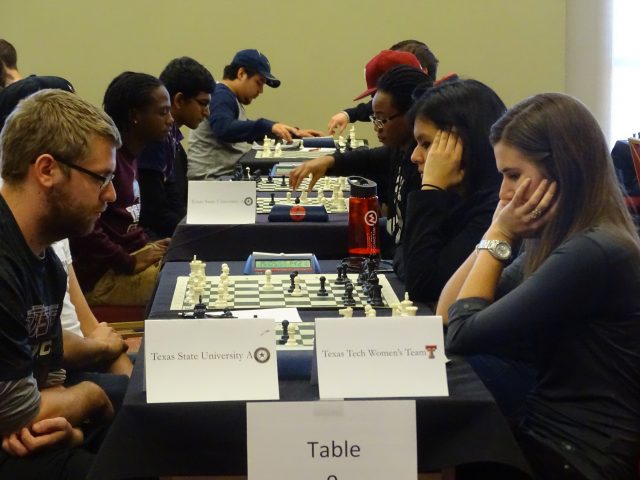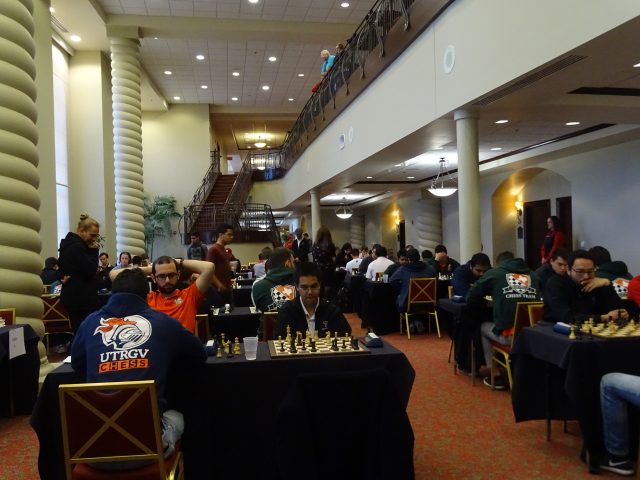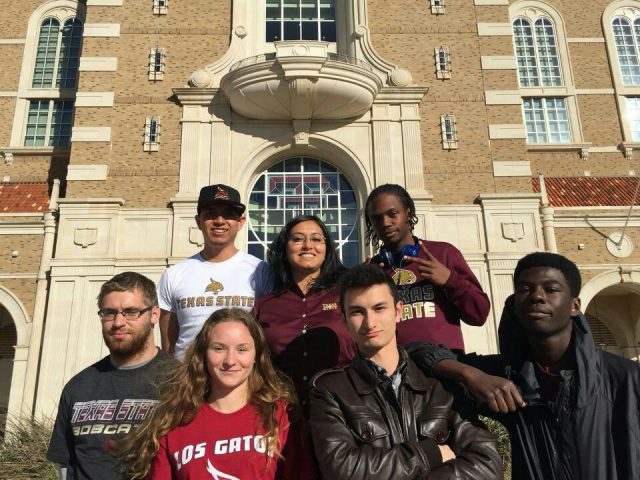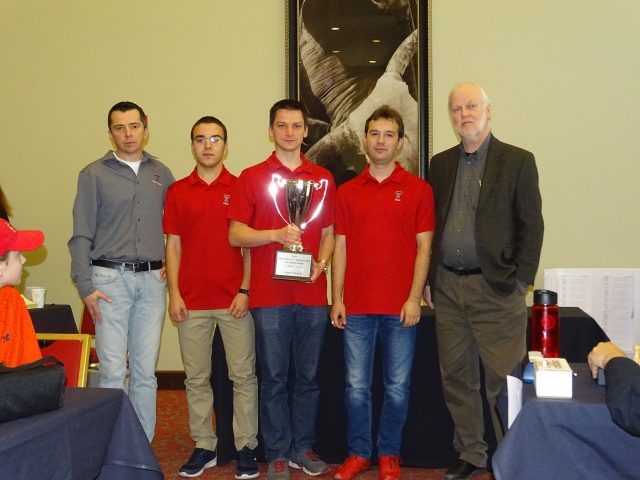
Just over a year ago, the directors and coaches of the top three collegiate chess programs in Texas, including Texas Tech University, the University of Texas Rio Grande Valley and the University of Texas at Dallas, got together to build a new format for the South West Collegiate Championship.
The tournament transformed into a one-day rapid tournament with a time control of 15 minutes per game and a 10-second increment per move. Another unique innovation was reducing of the number of boards. Our goal is to attract more players and from an elite-oriented tournament, while making it accessible for all collegiate players. Therefore, the three-player team makes it easier for smaller colleges and programs to participate in such event.
The new format proved a great success. Twenty-three teams participated in this year's event on February 25. Levels ranged from unrated players to very strong grandmasters. Twenty-nine members of the Knight Raiders chess club, founded in 2003 by Dr. Karlsson, professor of Geology, represented Texas Tech University. The University of Rio Grande Valley participated with six teams, and while the University of Texas at Dallas had four teams.
The tournament was hosted by Texas Tech University in Lubbock. During the offseason, the football stadium is empty, but it regained life for one day by becoming the home of the chess tournament. The tournament was played in one of the nicest suites and all players and coaches were invited to lunch on behalf of the organizers. The playing conditions were excellent.

Traveling from San Marcos, Texas State University made its debut at the SW Collegiate. Former Texas Tech alumni, Dr. Susana Villanueva recently became a professor at Texas State. In less than two months, she got involved with the chess life on campus, became a faculty advisor, and brought two teams to play in the tournament for the first time in the club history.
 Professor Susana Villanueva in the middle and the Texas State Team
Professor Susana Villanueva in the middle and the Texas State Team
Another new school which participated was the University of Oklahoma. Chess is big on their campus. Despite a small budget, the OU chess club has more than 200 members! Both Texas State and OU fought very well and finished in the middle of the cross table.
The Texas Tech A team won the event with a fantastic result. Scoring 14.5 individual points out of 15 games, they succeeded in winning all five matches. Having one GM and two international masters made the TTU A team slight underdogs since at least three other teams were higher rated and consisted fully of GMs. However, all three players Andrii Baryshpolets, Sergey Matsenko and Pavlo Vorontsov turned out to be in excellent form and played very good chess. Here are two games annotated by TTU players Andrey Baryshpolets and Pavlo Vorontsov:
[pgn]
[Event "Southwest Collegiate "]
[Site "Lubbock"]
[Date "2017.02.25"]
[White "Baryshpolets, Andrey"]
[Black "Popilski, Gil"]
[Result "1-0"]
[ECO "A63"]
[Annotator "Andrey Baryshpolets"]
[PlyCount "63"]
[EventDate "2017.02.25"]
[EventType "team-swiss (rapid)"]
[EventRounds "5"]
[EventCountry "USA"]
{Texas Tech's A team started the tournament by cruising to a 2-0 start. In
Round 3 we faced our first real test, playing against UT Dallas's A team, the
No. 2 seed.} 1. d4 Nf6 2. c4 g6 3. g3 Bg7 4. Bg2 c5 5. d5 a6 6. a4 d6 7. Nc3
O-O 8. Nf3 e6 9. O-O exd5 10. cxd5 Nbd7 11. h3 Rb8 12. Bf4 Qe7 {On the board a
rare line of Benoni Fianchetto variation arises.} 13. a5 $5 Nh5 ({another plan
for Black is} 13... b5 14. axb6 Nxb6 15. e4 Nfd7) 14. Bg5 f6 15. Bd2 f5 16. e4
$1 {Very energetic!} ({both} 16. Re1 {and}) (16. Qc1 {are not dangerous for
Black}) 16... fxe4 ({another critical line is} 16... f4 17. g4 Nhf6 18. Qc1 h5
$1 (18... Ne5 $6 19. Nxe5 dxe5 20. Na4 {White is simply better}) 19. g5 Ng4 $1
{the key idea of 16. ... f4} 20. Bxf4 Nge5 {Black seems to have
sufficient counterplay for the sacrificed pawn.}) 17. Re1 Ne5 $6 ({better was}
17... Nhf6 18. Ng5 Ne5 19. Ncxe4 Nd3 20. Re2 Nxe4 21. Nxe4 $14 {White is only
slightly better.}) 18. Nxe5 Bxe5 19. Nxe4 Bf5 (19... Bxb2 20. Ra2 Be5 21. Bh6
$16 {White has serious initiative}) 20. Nxc5 $1 {The most precise. Other
options are less promising for White.} (20. Bc3 Bxc3 21. bxc3 $14) (20. Ng5 Qf6
21. Ra3) 20... Qf6 (20... dxc5 21. Bc3 $18) 21. Rxe5 {This is the only
reasonable move. White eliminates the most powerful Black`s piece.} dxe5 (21...
Qxe5 22. Bc3 Qe7 23. Qd4 Ng7 (23... dxc5 24. Qh8+ Kf7 25. Qxh7+ Ke8 26. Re1 $18
) 24. Ne6 Bxe6 25. dxe6 $18 {with a decisive advantage}) 22. Be3 Qd6 ({The
only way to save a piece was} 22... Ng7 23. g4 Bc8 24. d6 $18 {however,
Black's position is still hopeless.}) 23. g4 Nf4 24. gxf5 Nxg2 25. Kxg2 gxf5
26. Ne6 Rf6 {White is completely winning} 27. f4 $6 {it was not necessary to
block Black`s pawns.} ({Better was the immediate} 27. Qb3) 27... Rg6+ 28. Kh2
Rc8 29. Qb3 h6 30. Rg1 Rxg1 31. Kxg1 exf4 32. Qxb7 {Black resigned} 1-0[/pgn]
[pgn]
[Event "Southwest Collegiate"]
[Site "?"]
[Date "2017.02.25"]
[White "Stremavicius, Titas"]
[Black "Vorontsov, Pavel"]
[Result "0-1"]
[ECO "E32"]
[WhiteElo "2468"]
[BlackElo "2477"]
[Annotator "Pavlo Vorontsov"]
[PlyCount "74"]
[EventDate "2017.??.??"]
[WhiteTeam "UTD-C"]
[BlackTeam "Texas Tech-A"]
1. d4 {Before this round our team shared the lead with the perfect 3-0
score and we were looking forward to continue the winning streak.} Nf6 2. c4 e6
3. Nc3 Bb4 4. Qc2 {One of the main options for white in this position.} d6 $5 {
A rare move, though it may lead to the main line via transposition.} 5. g3 $5 {
I didn't expect this move. The main drawback of this plan is its sluggishness.}
O-O 6. Bg2 e5 7. d5 c6 $1 {Trying to use the fact that white's king is still
in the center.} 8. e4 cxd5 9. cxd5 b6 $1 {An interesting choice. I am trying
to prevent white from castling and create some play against my opponent's king.}
10. Nge2 Ba6 11. a3 Bxc3+ 12. Nxc3 Nbd7 {Aiming for d3.} 13. Bf1 Bxf1 14. Kxf1
Rc8 15. Kg2 Nc5 16. f3 b5 {Black tries to create some pressure on the
queenside.} 17. Qe2 Nb3 18. Rb1 a6 19. Be3 Nd7 {The knight on b3 controls the
c1 square, therefore it's not easy for white to fight for the c-file.} 20. Na2
a5 {Prophylactics. This move stops the Na2-b4-c6 maneuver, however it was the
right moment to break through on the kingside.} (20... f5 21. exf5 Qf6 22.
g4 g6) 21. Qd3 {White is planning to take the b5 pawn after Ndc5 but...} (
21. Qxb5 $2 Rc2+ 22. Kg1 Ndc5) (21. Nc3 $142 b4 22. axb4 axb4 23. Nb5 $13)
21... Nd4 $1 22. Bxd4 exd4 {Now the knight on a2 is very poorly placed and
taking on d4 is always very dangerous for white. Black has some initiative.}
23. Rhd1 (23. Qxd4 $2 Rc2+ 24. Kg1 Ne5 $19) (23. Rhc1 $5 Qb6) 23... Qb6 (23...
f5 $5) 24. Qxd4 $2 (24. f4 $142 {It was necessary to restrict black's knight
by taking the e5 square under control.}) 24... Rc2+ 25. Kh3 Qc7 $6 (25... Qxd4
26. Rxd4 Ne5 $19 {was absolutely winning.}) 26. Rbc1 Ne5 27. Qe3 $6 (27. Rxc2
$142 Qxc2 28. Qd2 Qb3 29. Nc1 Qxf3 $15 {and white still has chances to hold.})
27... Qc8+ 28. g4 h5 29. Rxc2 hxg4+ $1 {now black is winning} 30. Kg3 Qxc2 31.
Rc1 Qxb2 32. Nc3 gxf3 33. Rg1 Rc8 34. Nd1 Qe2 35. Qg5 f2 36. Nxf2 Qf3+ 37. Kh4
Ng6+ 0-1 [/pgn]
 Picture of the winning team: Alex Onischuk, Pavlo Vorontsov, Sergey Matsenko, Andrii Baryshpolets, Dr. Hal Karlsson
Picture of the winning team: Alex Onischuk, Pavlo Vorontsov, Sergey Matsenko, Andrii Baryshpolets, Dr. Hal Karlsson
Three teams tied for second place but UTRGV A team finishing second by tie breaks leaving UTD B and C third and fourth, respectively.
Next year the tournament will be in Dallas and I expect even better attendance. It is great to see collegiate chess growing! See you at the Final Four!
| Place |
Team Name |
Total Match Points |
Total Individual Points |
USAT |
MMed |
| 1 |
TTU A |
5 |
14.5 |
84 |
|
| 2 |
UTRGV A |
4 |
12 |
65 |
|
| 3 |
UTD C |
4 |
10 |
58 |
|
| 4 |
UTD B |
4 |
10 |
51 |
|
| 5 |
UTRGV C |
3 |
11 |
55 |
|
| 6 |
UTRGV B |
3 |
10.5 |
56.5 |
|
| 7 |
TTU B |
3 |
9.5 |
36 |
|
| 8 |
UTD A |
3 |
9 |
58 |
|
| 9 |
Knight Raiders D |
3 |
7.5 |
21 |
11 |
| 10 |
TTU C |
3 |
7.5 |
21 |
10 |
| 11 |
UTRGV D |
3 |
7 |
30 |
|
| 12 |
OU |
2.5 |
7.5 |
13.5 |
|
| 13 |
TTU Women |
2.5 |
7 |
21.5 |
|
| 14 |
UTD D |
2 |
7 |
21 |
9.5 |
| 15 |
UTRGV E |
2 |
7 |
21 |
8.5 |
| 16 |
Texas State A |
2 |
6.5 |
18 |
|
| 17 |
Knight Raiders A |
2 |
6.5 |
15 |
|
| 18 |
Knight Raiders E |
2 |
5 |
18 |
|
| 19 |
Texas State B |
1 |
5 |
11 |
|
| 20 |
Knight Raiders C |
1 |
4 |
4 |
|
| 21 |
Knight Raiders F |
1 |
3 |
4 |
|
| 22 |
Knight Raiders B |
1 |
2.5 |
11 |
|
| 23 |
UTRGV F |
1 |
2 |
0 |
|
Look for our college related articles on US Chess, including a piece on the 2016 Pan-Ams by Al Lawrence. Just over a year ago, the directors and coaches of the top three collegiate chess programs in Texas, including Texas Tech University, the University of Texas Rio Grande Valley and the University of Texas at Dallas, got together to build a new format for the South West Collegiate Championship.
The tournament transformed into a one-day rapid tournament with a time control of 15 minutes per game and a 10-second increment per move. Another unique innovation was reducing of the number of boards. Our goal is to attract more players and from an elite-oriented tournament, while making it accessible for all collegiate players. Therefore, the three-player team makes it easier for smaller colleges and programs to participate in such event.
The new format proved a great success. Twenty-three teams participated in this year's event on February 25. Levels ranged from unrated players to very strong grandmasters. Twenty-nine members of the Knight Raiders chess club, founded in 2003 by Dr. Karlsson, professor of Geology, represented Texas Tech University. The University of Rio Grande Valley participated with six teams, and while the University of Texas at Dallas had four teams.
The tournament was hosted by Texas Tech University in Lubbock. During the offseason, the football stadium is empty, but it regained life for one day by becoming the home of the chess tournament. The tournament was played in one of the nicest suites and all players and coaches were invited to lunch on behalf of the organizers. The playing conditions were excellent.
Just over a year ago, the directors and coaches of the top three collegiate chess programs in Texas, including Texas Tech University, the University of Texas Rio Grande Valley and the University of Texas at Dallas, got together to build a new format for the South West Collegiate Championship.
The tournament transformed into a one-day rapid tournament with a time control of 15 minutes per game and a 10-second increment per move. Another unique innovation was reducing of the number of boards. Our goal is to attract more players and from an elite-oriented tournament, while making it accessible for all collegiate players. Therefore, the three-player team makes it easier for smaller colleges and programs to participate in such event.
The new format proved a great success. Twenty-three teams participated in this year's event on February 25. Levels ranged from unrated players to very strong grandmasters. Twenty-nine members of the Knight Raiders chess club, founded in 2003 by Dr. Karlsson, professor of Geology, represented Texas Tech University. The University of Rio Grande Valley participated with six teams, and while the University of Texas at Dallas had four teams.
The tournament was hosted by Texas Tech University in Lubbock. During the offseason, the football stadium is empty, but it regained life for one day by becoming the home of the chess tournament. The tournament was played in one of the nicest suites and all players and coaches were invited to lunch on behalf of the organizers. The playing conditions were excellent.
 Traveling from San Marcos, Texas State University made its debut at the SW Collegiate. Former Texas Tech alumni, Dr. Susana Villanueva recently became a professor at Texas State. In less than two months, she got involved with the chess life on campus, became a faculty advisor, and brought two teams to play in the tournament for the first time in the club history.
Traveling from San Marcos, Texas State University made its debut at the SW Collegiate. Former Texas Tech alumni, Dr. Susana Villanueva recently became a professor at Texas State. In less than two months, she got involved with the chess life on campus, became a faculty advisor, and brought two teams to play in the tournament for the first time in the club history.
 Professor Susana Villanueva in the middle and the Texas State Team
Professor Susana Villanueva in the middle and the Texas State Team Picture of the winning team: Alex Onischuk, Pavlo Vorontsov, Sergey Matsenko, Andrii Baryshpolets, Dr. Hal Karlsson
Picture of the winning team: Alex Onischuk, Pavlo Vorontsov, Sergey Matsenko, Andrii Baryshpolets, Dr. Hal Karlsson






